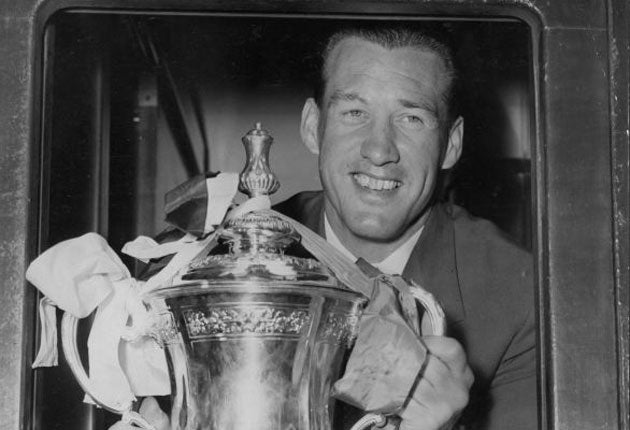Brian Viner: Never mind the lure of the lira. Lofthouse was happy, if poorer, as a one-club man
The Last Word

The two most eye-catching football stories of the past week, at least from where I was sitting, were the big-money transfer of Darren Bent from Sunderland to Aston Villa, and the death of Nat Lofthouse. It is frankly irresistible to connect the two.
Lofthouse was a one-club man, who in 452 appearances for Bolton Wanderers scored 255 goals, although sadly it is not recorded how often the goalkeeper ended up in the back of the net with the ball. Whatever, in 1952, Fiorentina made an offer for Lofthouse, a deal that financially would have set him up for life, but Bolton wouldn't countenance the idea of him even talking to his Italian suitors.
About the same time, a few miles to the west, there was similar hurrumphing in the Preston North End boardroom. The president of Palermo had offered Preston's star player Tom Finney £10,000 to sign on, £120 a week, a house and a car. When I interviewed Finney in 1999 he recalled that "I was on £14 a week at the time, and I must say I was very tempted. My room-mate Ivor Broadis couldn't believe his ears. I came home and told the chairman of Preston, a man called Nat Buck, who was in the building trade and had a broad Lancashire accent. He said, 'I'll tell thee now, if tha doesn't play for us, tha doesn't play for anyone'. And that was the end of it."
None of us, including 88-year-old Finney himself, mourns the passing of an era when clubs treated their players like chattels. But the pendulum has swung so far in the other direction that it has burst through its wooden casing. What would Lofthouse have made of the news that Bent, having had his career revitalised at Sunderland, had engineered a move just 18 months after his arrival from Tottenham? Moreover, if we are to believe what we read, one of his reasons for leaving was that he wanted to be closer to his family in Cambridgeshire. That other Lancastrian Nat, Mr Buck of Preston, must be turning in his grave.
As for the transfer fee, potentially rising to £24m, further comparisons between eras come to mind. Bent is a decent striker, without question, but that vast fee makes you wonder how many millions Lofthouse, the Lion of Vienna, might have been valued at, had he been born 60 years later. Conversely, what if Bent had been born 60 years earlier? Would he have stood an earthly of getting in the England team? During the years Lofthouse played for England, other available centre-forwards included Jackie Milburn, Stan Mortensen, Roy Bentley and Albert Stubbins, a list that Fabio Capello might look at and weep. He could shed a tear, too, and not just a patriotic one, over the five-man forward line – Matthews, Mortensen, Lawton, Mannion, Finney – England fielded against the world champions Italy in Turin in May 1948, a game England won 4-0. In fact Capello probably was shedding tears; he was not quite two years old at the time.
My only regret about Nat Lofthouse is that he was not more given to talking about his exploits. I tried on a few times to interview him, and on each occasion the message came back from Bolton that he'd rather not, thanks all the same. In 1987, however, he came to speak at the Rankin Club in Leominster, the small town close to where I now live in Herefordshire. And my friend John Beamon, who has been staging sporting talks at the Rankin for more than 30 years, tells me that the Lion of Vienna did not disappoint. "I remember asking him about Roy Hartle, who'd been a very tough full-back for Bolton. He said, 'Off the field, though you wouldn't believe it, Roy was the shyest, quietest, nicest man you could imagine. But if you'd put a No 11 shirt on his grandmother, he'd have kicked her to death'."
Those were the days.
How a 'trick' question landed quiz in the rough
In my Christmas quiz I asked which golfer had contested most Open Championships without ever winning the thing. I thought the answer was Dai Rees, largely because the official Royal and Ancient history of the Open told me so, giving Rees with 29 appearances, closely followed by Sam Torrance with 28, the unenviable record of vainly chasing the Claret Jug more than anyone else. The R&A book seemed like a pretty unimpeachable source, but it was inaccurate. Although many quiz entrants said Dai Rees, and duly got a big tick, a handful answered Ben Sayers, the little club-maker from North Berwick, now best remembered for the equipment company he started, but apparently even more of a swinger at the Open than Dai Rees, playing 35 times and twice finishing second. I'm truly sorry to those of you whose answers were wrongly marked wrong.
I apologise, too, to the nice PR people who set up my interview with the rugby union coach Shaun Edwards, which appeared in these pages yesterday. The piece was supposed to conclude with a line saying that Edwards is an ambassador for the sporting goods company Puma, and it didn't. Anyway, he is, and a very good one too.
Clever Carlisle spells it out for Campbell
Last year, the Burnley defender Clarke Carlisle, now also the chairman of the Professional Footballers' Association, delivered a stirring one-man counterblast to the popular notion that all footballers are thick, by winning Countdown. On Thursday evening he did it again, making a dignified and eloquent appearance on BBC1's Question Time. One of his fellow panellists, incidentally, was rabid Burnley fan Alastair Campbell, who may or may not have been aware that the seven-letter word which helped Carlisle win Countdown was...dossier.

Join our commenting forum
Join thought-provoking conversations, follow other Independent readers and see their replies